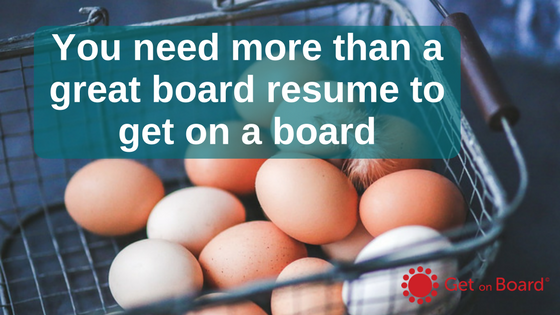You need more than a great board resume to get on a board

Jane has a great board resume. She went the extra mile and invested in getting the help of a professional board resume writer. Jane was really excited to land a board position and develop her board portfolio.
Using this great board resume, Jane applied for some board opportunities she found online; but she was getting disheartened with her lack of progress. She wasn’t even getting to the interview stage.
Confused, Jane came to me for help. “What am I doing wrong?” asked Jane.
“Well”, I said, “For board positions, you often need more than a great resume to get a seat at the table”.
Exasperated, Jane asked, “So what else do I need to do?”
Here’s the advice I give to all of the Jane’s (and Jack’s and anyone else) out there hunting down board opportunities.
1. Use a variety of sources to find opportunities
Finding a board opportunity is very much a numbers game. And creating a situation where you only have one avenue for board opportunities to come to you is going to get you nowhere fast.
Use a variety of sources to seek out and create board opportunities. These include: strategic networking (at events and outside of events); approaching organisations directly; asking your network for introductions; signing up to email alerts; engaging with executive recruiters; subscribing to board registers; and telling as many people in your personal and professional connections that you are looking for board opportunities. With all of these approaches, it helps to be specific about what you’re looking for.
2. Go out and meet people IRL
It turns out, face-to-face connection and engagement with people can be good for your board career. Board candidates are still largely recruited via the networks of the existing board members.
In the board world, it’s not what you know, it’s who you know.
Leverage this reality, get out there and meet people – the right people – and tell them about your board ambitions and articulate the value you would bring to a board. You never know where a board opportunity will come from.
3. Work on your personal branding – online and offline
Your reputation is your most significant asset when it comes to a board career. Therefore, it pays for you to be highly conscious of how you are impacting your reputation and personal branding through everything that you say and do. This includes your ‘day job’ and and the your results / value you deliver to your organisation through your work.
Set out the ways that you can become more intentional about your personal brand, particularly as an aspiring board member. Consider both your online and offline personas; are they positively reinforcing each other and the story your personal brand is telling about you?
4. Focus your efforts
Your hunt for board opportunities will yield better and faster results if you focus your efforts. Work at getting clarity around the type of organisation(s) that you want to join the board of. Knowing this will help you to know where to network, who in your network to request help from, the board registers to subscribe to, the organisation(s) to approach directly, prepare your board resume, and give you clues on how to develop and present your personal brand.
Really spend some time defining and refining the type of board(s) or organisation(s) you want to join. It’s worth pausing and reflecting on this point. Wanting to join any board just to join a board comes of as disingenuous and desperate.
5. Have patience
Boards are dealing with multiple issues at one time, meetings may be held infrequently, and a sudden crisis may appear. Usually the director recruitment process falls low on the board’s priority list.
Additionally, there are numerous board applications to sort through, with a formal selection process to be followed.
Be patient with the process, and be prepared for a ‘thanks, but no thanks’ response to your application. At the end of the day, a ‘no’ response is usually less about you, and more about the board or organisation. Pick yourself up and keep progressing forward with your board goals.
As Jane learnt, a great board resume is an essential in your board search; but it’s not the ONLY tool you need. Approach your board search strategically and in a broad fashion that opens up the most number of possibilities for you.

